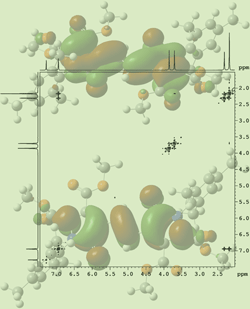issue contents
June 1999 issue

Cover illustration: Study of a diastereoisomeric dihydrothiophene derivative at 150 K, see Diánez, Estrada, López-Castro & Pérez-Garrido, pages 1020-1023. Displacement ellipsoids are shown at the 50% probability level.
cif-access (inorganic compounds)
Download citation


Download citation


During the attempted crystal growth of periodate complexes of lanthanide elements, good quality crystals of ammonium iodate(VII) formed and were used to confirm the structure. The I—O distance was 1.772(3)Å, and the O—I—O angles were 108.4(1) (×4) and 111.6(2)° (×2).
cif-access (metal-organic compounds)
Download citation


Download citation


The Na+ ion is in a distorted octahedral enviroment, with four vertices being occupied by water O atoms and two by carboxylate O atoms. The structure is composed of discrete [C6H2Cl2NO2CO2]− anionic units, held together by intervening Na+ ions and two nobreak water molecules.
Download citation


Download citation


The sodium ion, located on a threefold axis, is surrounded by six centrosymmetric dioxane molecules octahedally, which link sodium ions to give a polymeric structure.
Download citation


Download citation


Numerous intra- and intermolecular hydrogen bonds exist in the title compound, hexaaquanickel(II) μ-triethylenetetraaminehexaacetato-bis[aquadinickel(II)], [Ni(H2O)6]2+.[Ni2(TTHA)(H2O)2]2−.4H2O. The [Ni(H2O)6]2+ cations are connected by hydrogen bonds to form a one-dimensional chain and the whole molecule forms an intricate three-dimensional network.
Download citation


Download citation


The centrosymmetric title complex [CuL2(NO3)2], where L is 3-acetylamino-1,2,4-triazole, has been investigated. The environment of the Cu atom is elongated octahedral.
Download citation


Download citation


In the title compound, the Pd atom is coordinated to cis-[Ph2PC(H)=(H)CPPh2] through the P atoms and to two Cl atoms in a slightly distorted square-planar arrangement, with the most noticeable distortion in the P—Pd—P angle of 86.10(4)°. The Pd—P and Pd—Cl bond lengths of 2.2291(8) and 2.3617(8)Å, respectively, are similar to the values found in related palladium(II) complexes.
Download citation


Download citation


In the title compound, the LaIII ion is 12-coordinate, surrounded by six bidentate nitrate groups, with La—O bond lengths ranging from 2.627(2) to 2.706(2)Å. Hydrogen bonding between the lattice water molecule and the nitrate O atoms forms a one-dimensional zigzag chain.
cif-access (organic compounds)
Download citation


Download citation


In the title compound, the two rings are approximately coplanar. The molecule lies on a crystallographic inversion center and adopts the anti conformation, keeping the methyl groups apart.
Download citation


Download citation


The crystallographic structures of 3α,4α-dibromomethano-3,5,5-trimethyldecahydro-1H-benzocycloheptene-9,1'-spiro(2',2'-dibromocyclopropane), C17H24Br4, (3), 3α,4α-dichloromethano-3,5,5-trimethyldecahydro-1H-benzocycloheptene-9,1'-spiro(2',2'-dichlorocyclopropane), C17H24Cl4, (4), and 9α,9aα-dichloromethano-3,5,5,9-tetramethyl-1,4a,5,6,7,8,9,9a-octahydro-2H-benzocycloheptene, C16H24Cl2, (5), resulting from cyclopropanation reactions of the C=C double bonds of α-cis-himachalene and β-himachalene, are reported.
Download citation


Download citation


In the title compound, the ammonium cation is connected to tartrate anions and water molecules through O—H⋯O and N—H⋯O hydrogen bonds. As a whole, the structure is stabilized by numerous hydrogen bonds.
Download citation


Download citation


The racemate DL-aminophenylacetic acid (DL-2-amino-2-phenylethanoic acid) crystallizes in space group P21/c. The crystal is divided into distinct hydrophilic and hydrophobic layers. The structure is part of an ongoing program to provide accurate H-atom positions in crystal structures of hydrophobic amino acids [Dalhus & Görbitz (1999a). Acta Cryst. C55. In the press].
Download citation


Download citation


The title compound is an original potential drug analogue of clozapine (C18H19ClN4), a well known atypical antipsychotic compound. The crystal structure is isostructural with that of C18H18ClN3S published previously. The selenoazepine ring adopts a boat conformation and the piperazine ring has a normal chair conformation.
Download citation


Download citation


The title compounds, C14H18O3, (1), and C15H20O3, (2), are in monoclinic space groups C2/c and P21/c, respectively. The cyclohexane ring adopts a chair conformation in both cases. The plane of the central four atoms makes an angle of 87.1(1)° with the phenyl ring in (1) and and angle of 51.3(1)° in (2). Both structures have an intra- and an intermolecular hydrogen bond.
Download citation


Download citation


A single-crystal structure analysis of the new title compound reveals an intermolecular hydrogen bond between the 2-methylhydroxyl group and the P=O group.
inorganic compounds
Download citation


Download citation


The title compound, tetrapotassium diantimony trioxide, crystallizes in the hexagonal space group P63mc. The structure consists of stacking of trigonal–pyramidal Sb2O34− anions along the c axis. The Sb—Sb bond length of 2.803(3)Å corresponds to a metal–metal single bond, while very short Sb—O bond lengths of 1.74(2)Å are characteristic of double bonds.
Download citation


Download citation


The title compound, tetracalcium dialuminum dodecahydroxide dinitrate tetrahydrate, is a layered compound constituted by positively charged [Ca4Al2(OH)12]2+ main layers and negatively charged [2NO3.4H2O]2− interlayers. The interlayer part of the structure is strongly disordered.
Download citation


Download citation


The structure of the title compound is built up of groups of four layers of WO6 octahedra linked together through a layer of a different type consisting of isolated WO5 trigonal bipyramids. The Na atoms are distributed in the hexagonal holes of these layers.
Download citation


Download citation


The space group of the title compound, tetramolybdenum undecaoxide, has been confirmed to be Pna21. Three out of the four Mo atoms are each coordinated by six O atoms to form MoO6 octahedra. The remaining Mo atom is coordinated by four O atoms to form an MoO4 tetrahedron.
Download citation


Download citation


The structure of rubidium molybdyl arsenate consists of AsO4 tetrahedra and MoO6 octahedra sharing corners to form a three-dimensional framework containing large tunnels, parallel to [110], where the Rb+ ions are located. RbMoO2AsO4 is isostructural with the phosphate KMoO2PO4. They both crystallize in the orthorhombic space group Fddd.
Download citation


Download citation


A new polymorph of NaCoPO4, sodium cobalt(II) phosphate, crystallizes with a monoclinic modification of the zeolite ABW structure. The five-coordinate Na+ cations reside within channels running through an open cobalt–phosphate framework constructed from four-, six- and eight-membered rings of alternating CoO4 and PO4 tetrahedra.
metal-organic compounds
Download citation


Download citation


Download citation


Download citation


Download citation


Download citation


Download citation


Download citation


Download citation


Download citation


Download citation


Download citation


Download citation


Download citation


Download citation


Download citation


Download citation


Download citation


Download citation


Download citation


Download citation


Download citation


Download citation


Download citation


Download citation


Download citation


Download citation


Download citation


Download citation


Download citation


Download citation


Download citation


Download citation


Download citation


Download citation


Download citation


Download citation


Download citation


Download citation


Download citation


Download citation


Download citation


Download citation


Download citation


Download citation


Download citation


Download citation


Download citation


Download citation


Download citation


Download citation


Download citation


Download citation


Download citation


Download citation


Download citation


Download citation


Download citation


Download citation


Download citation


Download citation


Download citation


Download citation


Download citation


Download citation


Download citation


Download citation


Download citation


Download citation


Download citation


Download citation


Download citation


organic compounds
Download citation


Download citation


Download citation


Download citation


Download citation


Download citation


Download citation


Download citation


Download citation


Download citation


Download citation


Download citation


Download citation


Download citation


Download citation


Download citation


Download citation


Download citation


Download citation


Download citation


Download citation


Download citation


Download citation


Download citation


Download citation


Download citation


Download citation


Download citation


Download citation


Download citation


Download citation


Download citation


Download citation


Download citation


Download citation


Download citation


Download citation


Download citation


Download citation


Download citation


Download citation


Download citation


Download citation


Download citation


Download citation


Download citation


Download citation


Download citation


Download citation


Download citation


Download citation


Download citation


Download citation


Download citation


Download citation


Download citation


Download citation


Download citation


Download citation


Download citation


Download citation


Download citation


Download citation


Download citation


Download citation


Download citation


Download citation


Download citation


Download citation


Download citation


Download citation


Download citation


Download citation


Download citation


Download citation


Download citation


Download citation


Download citation


Download citation


Download citation


Download citation


Download citation


Download citation


Download citation


Download citation


Download citation




 journal menu
journal menu




















































































































